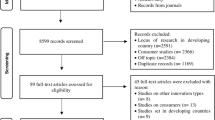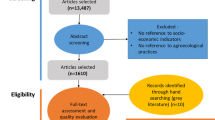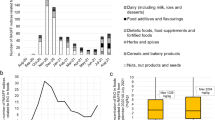Abstract
Unannounced audits are a verification mechanism that may improve the effectiveness and quality of certification programs. In this context, the question arises of whether unannounced audits are really effective, and if so, to what extent. To address this, a data set provided by the German Federal Office for Agriculture and Food (BLE) containing information reported by 23 certification bodies (CBs) was analysed. The analysis was constrained by the complicated and limited reporting system implemented by the German Regional and National Competent Authorities. This suggests that the structure of official reports should be revised and improved. In any case, the relatively low number of sanctions per operator detected in this study suggests that either the majority of operators are in line with the major requirements of the EU legislation on organic farming or that the CBs do not detect all non-compliances. Further research using more disaggregated data is needed to provide more evidence about the impact of unannounced audits on the reliability of the organic certification system.




Similar content being viewed by others
Notes
Certification is defined as “the (voluntary) assessment and approval by an (accredited) party on an (accredited) standard” (Meuwissen et al. 2003). Similarly, according to Giannakas (2002) certification is “a process through which unobservable product characteristics (such as the process through which they have been produced) are ‘guaranteed’ to consumers through a label. To avoid conflicts of interest, the guarantee is usually issued by a third (private or public) independent party whose ability to verify producer claims is greater than that of an individual”.
Non-compliance means any act against the feed or food law and against the rules for the protection of animal health and welfare (European Union 2004, Article 2(10)).
Sanctions on product lots are applied in case of detected irregularities. When an irregularity is found the indications referring to the organic production method are removed from the entire lot or production run affected by the irregularity concerned (European Union 2007, Article 30(1)).
Sanctions on operators are applied in case of detected severe infringements or an infringement with prolonged effect. When an infringement is found, the operator is prohibited from marketing products with indications referring to the organic production method for a certain period (European Union 2007, Article 30(1)).
Including sanctions on a lot and on the operator.
Giving that it is not possible to distinguish CBs in the anonymous data set, comparisons across years are not possible.
The risk analysis takes into consideration factors such as results of previous inspections, quantity of products and the risk of product contamination as a result of parallel organic and non-organic productions (European Union 2008a).
Because of the length of the analysis, we omitted the presentation of these results here. However, a set of tables showing the comparison analysis is available upon request.
Lighter sanctions were not available in the provided data set.
References
Achilleas K, Anastasios S (2008) Marketing aspects of quality assurances systems: the organic food sector case. Br Food J 110(8):829–839. doi:10.1108/00070700810893359
AFI (2013) Reports on different AFI-meetings. Anti-fraud Initiative. http://www.organic-integrity.org. Accessed 16 April 2013
Albersmeier F, Schulze H, Jahn G, Spiller A (2009a) The reliability of third-party certification in the food chain: from checklist to risk-oriented auditing. Food Control 20(10):927–935. doi:10.1016/j.foodcont.2009.01.010
Albersmeier F, Schulze H, Spiller A (2009b) Evaluation and reliability of the organic certification system: perceptions by farmers in Latin America. Sustain Dev 17(5):311–324. doi:10.1002/sd.426
Anders SM, Souza Monteiro DM, Rouvier E (2007) Objectiveness in the market for third-party certification: does market structure matter? In 105th Seminar of the European Association of Agricultural Economists (EAAE). Bologna, Italy http://purl.umn.edu/7894 Accessed 3 March 2011
BLE (2003) Leitlinien zum zulassungsverfahren der privaten kontrollstellen gemäß Verordnung (EWG) Nr. 2092/91 des Rates vom 24.06.1991 über den ökologischen Landbau und die entsprechende Kennzeichnung der landwirtschaftlichen Erzeugnisse und Lebensmittel. Bundesanstalt für Landwirtschaft und Ernährung, Bonn, Germany
BLE (2010) Leitlinien zum Zulassungsverfahren der privaten Kontrollstellen gemäß Verordnung (EG) Nr. 834/2007 des Rates vom 28.06.2007 über die ökologische/biologische Produktion und die Kennzeichnung von ökologischen/-biologischen Erzeugnissen in der jeweils geltenden Fassung sowie ihren Durchführungsbestimmungen. Bundesanstalt für Landwirtschaft und Ernährung, Bonn, Germany
Codex Alimentarius Commission (1999) Guidelines for the production, processing, labelling and marketing of organically produced foods. FAO/WHO International Food Standards. http://www.codexalimentarius.org/standards/list-of-standards/en/?provide=standards&orderField=fullReference&sort=asc&num1=CAC/GL. Accessed 29 March 2012
ECA (2012) Audit of the control system governing the production, processing, distribution and imports of organic products. European Court of Auditors. Special report No. 9. http://eca.europa.eu/portal/pls/portal/docs/1/15220773.PDF. Accessed 16 April 2013
Eden S, Bear C, Walker G (2008) The sceptical consumer? Exploring views about food assurance. Food Policy 33(6):624–630. doi:10.1016/j.foodpol.2008.02.003
European Union (2004) Regulation (EC) No 882/2004 of the European Parliament and of the Council on official controls performed to ensure the verification of compliance with the feed and food law, animal health and animal welfare rules. In Official Journal (Ed.), L 165, 30.04.2004
European Union (2007) Council Regulation (EC) No 834/2007 on organic production and labelling of organic products and repealing Regulation (EEC) No 2092/91. In Official Journal (Ed.), L 189, 20.07.2007
European Union (2008a) Commission Regulation (EC) No 889/2008 on detailed rules for the implementation of Council Regulation (EC) No 834/2007 on organic production and labelling of organic products with regard to organic production, labelling and control. In Official Journal (Ed.), L 250, 18.09.2008
European Union (2008b): Commission Decision (2008/654/EC) on guidelines to assist Member States in preparing the annual report on the single integrated multiannual national control plan provided for in Regulation (EC) No 882/2004 of the European Parliament and of the Council. In Official Journal (Ed.), L 214, 09.08.2008
Fischer U, Neuendorff J (2009) Handbuch für Öko-Kontrollstellen. http://orgprints.org/16030/. Accessed 15 December 2012
GfRS (2003) Analyse der Schwachstellen in der Kontrolle nach EU-Verordnung 2092/91 und Erarbeitung von Vorschlägen zur Weiterentwicklung der Zertifizierungs- und Kontrollsysteme im Bereich des Ökologischen Landbaus. Gesellschaft für Ressourcenschutz, mbH. http://orgprints.org/2495/. Accessed 15 December 2012
Giannakas K (2002) Information asymmetries and consumption decisions in organic food product markets. Can J Agr Econ 50(1):35–50. doi:10.1111/j.1744-7976.2002.tb00380.x
Hatanaka M, Busch L (2008) Third-party certification in the global agrifood system: an objective or socially mediated governance mechanism? Sociologia Ruralis 48(1):73–91. doi:10.1111/j.1467-9523.2008.00453.x
Hatanaka M, Bain C, Busch L (2005) Third-party certification in the global agrifood system. Food Policy 30(3):354–369. doi:10.1016/j.foodpol.2005.05.006
IFOAM. (2006) The IFOAM norms for organic production and processing version 2005. http://shop.ifoam.org/bookstore/download_preview/IFOAM_NORMS_2005_intro.pdf. Accessed 30 March 2012
Jahn G, Schramm M, Spiller A (2004) Differentiation of certification standards: the trade-off between generality and effectiveness in certification systems. In 14th IAMA World Forum and Symposium. Montreux, Switzerland https://www.ifama.org/events/conferences/2004/cmsdocs/Jahn1024.pdf. Accessed 15 March 2011
Jahn G, Schramm M, Spiller A (2005) The reliability of certification: quality labels as a consumer policy tool. J Consum Policy 28(1):53–73. doi:10.1007/s10603-004-7298-6
Janssen M, Hamm U (2011) Consumer perception of different organic certification schemes in five European countries. Org Agr 1(1):31–43. doi:10.1007/s13165-010-0003-y
MAFF (2010) Questions and answers on the Japanese agricultural standards for organic plants and organic food processed food. Labelling and Standard Division, Japanese Ministry of Agriculture Forestry and Fisheries. http://www.maff.go.jp/e/jas/specific/pdf/ojasqa.pdf. Accessed 28 January 2011
Meuwissen MPM, Velthuis AGJ, Hogeveen H, Huirne RBM (2003) Traceability and certification in meat supply chains. J Agribus 21(2):167–181
Müller C (2004) Bilanzskandale-Eine institutionenökonomische Analyse. Perspekt Wirtsch 5(2):211–225. doi:10.1111/j.1468-2516.2004.00148.x
Padilla Bravo C, Spiller A, Villalobos P (2012) Are organic growers satisfied with the certification system? A causal analysis of farmers’ perception in Chile. Int Food Agribusiness Manag Rev 15(4):115–136
Schulze H, Spiller A (2010) Farmers’ acceptance of the organic certification system in Germany: a partial least squares model. J Int Food Agribus Mark 22(1–2):7–36. doi:10.1080/08974430903372724
Schulze H, Jahn G, Neuendorff J, Spiller A (2008) Die Öko-Zertifizierung in Deutschland aus Sicht der Produzenten: Handlungsvorschläge zur politischen Weiterentwicklung. Berichte über Landwirtschaft–Zeitschrift für Agrarpolitik und Landwirtschaft, hrsg. vom Bundesministerium für Ernährung, Landwirtschaft und Verbraucherschutz (BMELV), Heft Nr. 3/2008
USDA (2000) Federal Register. National Organic Program-final rule vol. 65 No 246. http://www.ams.usda.gov/AMSv1.0/getfile?dDocName=STELPRDC5087165. Accessed 29 March 2012
Zorn A, Lippert C, Dabbert S (2010) Analyse der Kontroll und Sanktionshäufigkeiten grosser Ökokontrollstellen in Deutschland. In Agrar- und Ernährungsmärkte nach dem Boom, (Eds.) J-P. Loy, R. Müller. Landwirtschaftsverlag GmbH, Münster, pp. 271–282
Zorn A, Lippert C, Dabbert S (2012) Supervising a system of approved private control bodies for certification: the case of organic farming in Germany. Food Control 25(2):525–532. doi:10.1016/j.foodcont.2011.11.013 doi:10.1016/j.foodcont.2011.11.013#doilink
Acknowledgments
We would like to thank the German Federal Office for Agriculture and Food (Bundesanstalt für Landwirtschaft und Ernährung (BLE)) for providing the data set to carry out this research. The authors would like also to thank the two anonymous referees as well as the Editor for the useful suggestions and comments, which helped to improve the scientific quality of this manuscript.
Author information
Authors and Affiliations
Corresponding author
Rights and permissions
About this article
Cite this article
Padilla Bravo, C., Villanueva Ramírez, I., Neuendorff, J. et al. Assessing the impact of unannounced audits on the effectiveness and reliability of organic certification. Org. Agr. 3, 95–109 (2013). https://doi.org/10.1007/s13165-013-0048-9
Received:
Accepted:
Published:
Issue Date:
DOI: https://doi.org/10.1007/s13165-013-0048-9




